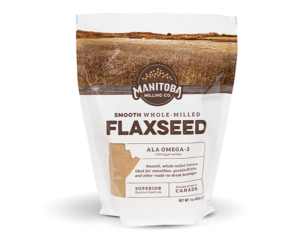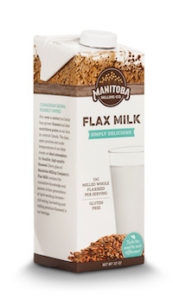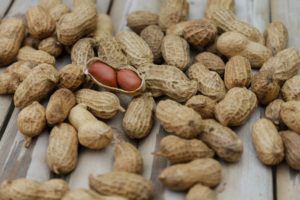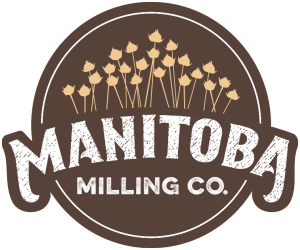3 Benefits of Plant-Based Diets & Where to Find Plant-Based Protein
Plant-based diets offer a variety of health benefits. This is true even if you are not a full vegan or vegetarian.
Table of Contents
ToggleWhat Is A Plant-Based Diet?
Plant-based eaters choose to eat mostly plants, including fruits, veggies, beans, legumes, and whole grains. Vegetarians do not eat meat and vegans do not eat any animal products including meat, dairy, eggs, or honey.
Some varieties of plant-based eating allow meat or seafood, such as a flexitarian or pescatarian. This allows for occasional or even nightly meat or seafood consumption while focusing most food choices on plants.
Manitoba Milling Co. Flaxseed and Flax Milk are great for people who eat a plant based diet.
Did you know you can use flaxseed in place of eggs in baking recipes? Mix 1 Tbsp of Smooth-Milled Flaxseed with 3 Tbsp water and it will form a gel-like consistency, similar to egg whites (watch this video to learn how!). This works great for binding in breads, muffins, and even veggie burgers.
Flax Milk is also a great for vegans and plant-based eaters because it provides more protein than almond milk and it naturally contains the daily recommended amount of Omega-3s, this is important for those who limit fish. Learn more about Manitoba Milling Co. Flax Milk here.

Below a few health benefits of a plant forward diet as well as a many places you can find protein if you choose to eat a more plant focused diet.
What are the Health Benefits of a Plant-Based Diet?
1. Weight Management
Vegetarians and vegans have a lower rate of obesity because their diets emphasize lower calorie yet nutrient dense foods.
2. Better Heart Health
Studies have found that there are lower rates of heart disease (as well as other chronic diseases) in people who eat plant-based diets. Plant-based diets have also been connected to lower cholesterol and lower blood pressure.
3. Improved Gut Health
Research has linked diets high in animal products to altered gut microbiota as well as inflammation. Plant-based diets are also high in fiber which is great for the digestive system. Because plant-based focus on fruits and veggies they are often high in antioxidants which may protect against inflammation.
This Harvard study, showed differences in gut bacteria when consuming a diet high in animal proteins versus a diet mainly comprised of vegetables, fruits, whole grains, and plant-based proteins.

Can You Get Enough Protein from a Plant-Based Diet?
Many people are concerned that if they switch to a plant-based diet they will not get enough protein. While this is a valid concern, there are plenty of plants that provide good sources of protein.
And actually, many meat servings actually contain more protein than your body can use at once.
Scroll down to see a short list of a few plant based sources of protein.
How Do You Know How Much Protein You Need?
Use the following equation to estimate how much protein you need each day.
Your weight in kilograms (pounds divided by 2.2) x 0.8g/kg (use this number if you are not very active)
If you are lightly active (exercise up to 3 days per week) multiply your weight in kg by 1.0.
If you are quite active (intense exercise 5 days per week) multiply by 1.2.
*Note: These are general guidelines, please ask your registered dietitian what is best for you.
What Foods Have Plant Based Protein?
Below you’ll find examples of some plants that provide a good source of protein. There are many more among these, but in general you can usually count on nuts, seeds, nut butters, beans, legumes, and whole grains.
Both Manitoba Milling Co. Smooth Whole Milled Flaxseed and Flax Milk provide 3 grams of protein per serving. Get yours here!
| Type of Food | Serving Size | Protein per Serving (g) |
| Nuts & Seeds | ||
| Manitoba Milling Co. Flaxseed | 2 Tbsp | 3g |
| Pumpkin Seeds | 1 oz | 5g |
| Sunflower Seeds | ¼ cup | 7g |
| Nut Butters | ||
| Peanut Butter | 2 Tbsp | 8g |
| Almond Butter | 2 Tbsp | 7g |
| Sunflower Seed Butter | 2 Tbsp | 6g |
| Plant Based Milks | ||
| Flax Milk | 1 cup | 3g |
| Soy Milk | 1 cup | 8g |
| Almond Milk | 1 cup | 1g |
| Vegetables | ||
| Brussels Sprouts | 1 cup | 3g |
| Edamame | 1 cup | 18g |
| Spinach, cooked | 1 cup | 5g |
| Beans & Legumes | ||
| Lentils | 1 cup | 18g |
| Black Beans | 1 cup | 39g |
| Chickpeas | 1 cup | 39g |
| Whole Grains | ||
| Quinoa | 1 cup | 8g |
| Brown Rice | 1 cup | 5g |
| Barley | 1 cup |
23g |

1 Comment.
[…] diets have become all the rage lately, and for good reason! There are plenty of benefits to support a diet centered around plants whether related to health, the environment or improved […]